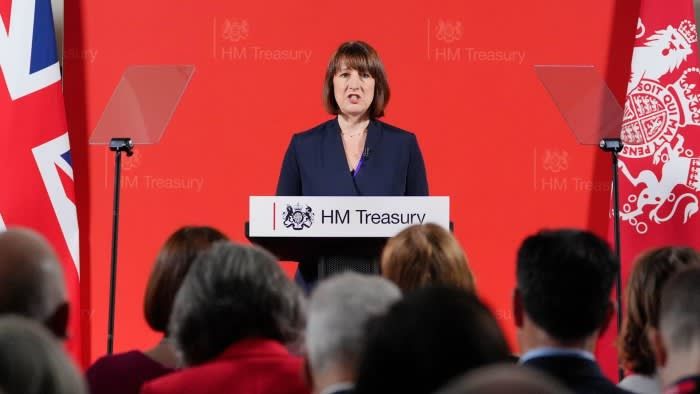Rachel Reeves warns UK public finances in worst state since second world war

Access the Editor's Digest at no cost
Roula Khalaf, the person in charge of the FT, picks out her top stories for this weekly newsletter.
Rachel Reeves cautioned that the new Labour government in Britain is facing the most challenging situation since World War II. She has called on the Treasury to review the previous spending policies of the Conservative Party.
During her debut speech as the UK chancellor, she laid the foundation for making difficult decisions regarding the country's finances. She promised to focus on promoting economic growth and removing obstacles for housing developments and onshore wind farms.
Reeves stated on Monday that we are dealing with the consequences of 14 years of disorder and financial recklessness. That is why I asked Treasury officials over the weekend to evaluate our financial situation so that I can grasp the extent of the problem.
The report on the financial legacy left by Rishi Sunak's government will be released before parliament takes its summer break this month.
In a clear nod to the possibility of implementing spending limits or increasing taxes, Reeves stated that the review will prepare for "challenging decisions" in an upcoming Budget this autumn. The specific date of the Budget announcement will be made before MPs take a break for the summer.
Reeves stated that her observations over the past three days have only solidified her previous cautions about the challenging circumstances that the winner of the general election will face, comparing them to the challenges seen during the second world war.
During the election, the Conservative party warned that Labour might suddenly increase taxes if they came into power. They believe that the review will give Reeves a reason to raise taxes in the upcoming autumn Budget.
A former Conservative government official mentioned that all information about how taxpayer money is being spent is already available to the public. This information can be found in forecasts from the Office for Budget Responsibility or in spending estimates that are approved by parliament.
"It's just an excuse," the former minister stated. "This is exactly what we predicted they would do when we warned about raising taxes."
Someone who knows Reeves well mentioned that the workout would help the chancellor inform parliament about the current situation in the economy. They clarified that it was not going to be a Budget or a full spending review.
Reeves, chosen by Sir Keir Starmer after Labour's big election victory last week, announced that the UK now has a government that is secure and will collaborate with businesses. She promised to ensure that the country becomes a welcoming place for investments.
Reeves explained that she plans to improve growth by making changes to the slow and inefficient planning system in the UK. She emphasized that her party was elected with a promise to take action and revitalize construction in the country.
She restated Labour's goal of constructing 1.5 million new homes within the next five years, setting up actions like modifying the National Planning Policy Framework by the end of the month.
Additionally, she mentioned that there would be a reintroduction of mandatory housing goals and an end to the unofficial prohibition on onshore wind farms in England.
Reeves mentioned that she will try to clear obstacles for "delayed projects" of major housing developments that are currently facing challenges. She also stated that the government has intervened in two planning appeals for data centers.
The government is planning to reevaluate the limits of the green spaces surrounding major cities, with the goal of allowing additional construction on land that is currently protected, even though it may not be of high quality.
Reeves promised to make firm decisions when it comes to planning, stating: "We will not give in to the current situation that only rejects any options by saying no."
Neil Jefferson, leader of the Home Builders’ Federation, was happy that local governments now have housing targets again. He believes that good planning and accountability from councils are necessary for building homes to meet the needs of communities.
However, Jefferson expressed the necessity for the government to remove obstacles for 160,000 homes that are currently delayed due to environmental regulations. He also suggested providing assistance to buyers of newly constructed homes in order to stimulate further development.
Reeves mentioned that she had been given a document from ex-Bank of England leader Mark Carney on how to put into action Labour's proposals for a fresh £7.3 billion national wealth fund to support expanding sectors.
She mentioned that the following actions would be revealed soon.
When questioned about how to lessen the strain on public finances, Reeves stated that she did not have any plans to alter the method in which the BoE provides interest on commercial banks' reserves.
Some people were talking about the possibility of lowering interest rates on portions of the reserves in order to increase the amount of money available for government spending.









































